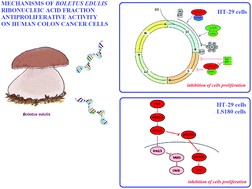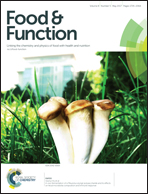New insights into the molecular mechanism of Boletus edulis ribonucleic acid fraction (BE3) concerning antiproliferative activity on human colon cancer cells
Abstract
One of the relatively new and promising strategies of cancer treatment is chemoprevention, which involves the use of natural or synthetic compounds to block, inhibit or reverse carcinogenesis. A valuable and still untapped source of chemopreventive compounds seems to be edible mushrooms belonging to higher Basidiomycetes. Boletus edulis biopolymers extracted with hot water and purified by anion-exchange chromatography showed antiproliferative activity in colon cancer cells, but only fraction BE3, mostly composed of ribonucleic acids, was able to inhibit DNA synthesis in HT-29 cells. The present work aims to elucidate the molecular mechanism of this Boletus edulis ribonucleic acid fraction and in this sense flow cytometry and western blotting were applied to cell cycle analysis in HT-29 cells. We found that the antiproliferative ability of fraction BE3 observed in HT-29 cells was associated with the modulation of expression of cell cycle regulatory proteins (Cyclin D1, Cyclin A, p21 and p27) leading to cell accumulation in the S phase of the cell cycle. Furthermore, the BE3 fraction showed effective silencing of the signal transduction in an MAPK/Erk pathway in HT-29 and LS180 colon cancer cell lines. Thus, the previously and currently obtained results indicate that the BE3 fraction from Boletus edulis has great potential and needs to be further exploited through animal and clinical studies in order to develop a new efficient and safe therapeutic strategy for people who have been threatened by or suffered from colon cancer.



 Please wait while we load your content...
Please wait while we load your content...